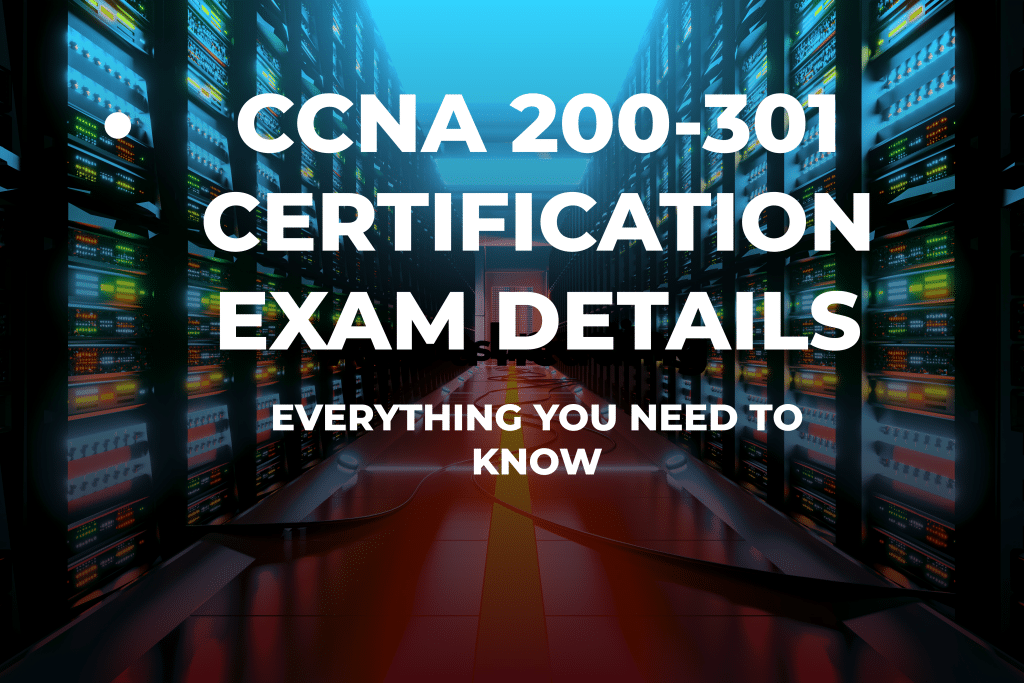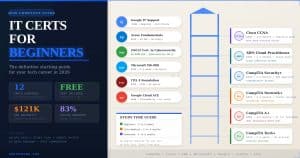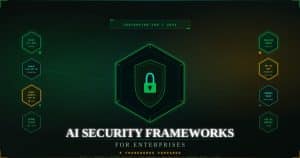The CCNA 200-301 isn’t just another cert; it’s one that holds weight in IT. It’s like the gold standard for networking newbies and mid-level techies looking to prove their worth. This is not just about adding a line to your résumé; it’s about gaining real-world, job-ready skills that make you stand out. Think of it like this: when you show up with a CCNA badge, it’s like saying, “Yeah, I know my stuff.”
The CCNA covers a wide range of topics that matter in today’s networks. You don’t just learn the basics and call it a day. Instead, you dive into routing, switching, wireless networking, security, and automation. It’s a mix of traditional and modern networking—exactly what businesses need. It reflects how IT has grown, bridging old-school hardware with today’s software-defined networks. Cisco didn’t slap together an outdated syllabus; they keep it aligned with what the market demands.
In this blog post, we will explore everything about CISCO CCNA 200-301 exam. We will cover, in details, why it is a good-to-have certification, what you can expect after getting this credential, and how you can prepare for this exam. We will also explore how study materials such as CCNA 200-301 Exam Dumps can impact your exam preparation, and other tips and tricks that you can use to pass this exam in the first attempt.
So let’s deep dive into CISCO CCNA 200-301 Certification.
CCNA 200-301 — Quick Specs
| Certification | Cisco Certified Network Associate (CCNA) |
|---|---|
| Exam code | 200-301 |
| Official exam name | Implementing and Administering Cisco Solutions (200-301 CCNA) v1.1 |
| Vendor | Cisco |
| Delivery | Proctored via Pearson VUE — test center or online (OnVUE) |
| Duration | 120 minutes |
| Price | US $300 (regional taxes may apply) |
| Languages | English, Japanese |
| Scoring | Pass/Fail; Cisco does not publish a fixed passing score. You receive a section-by-section score report. |
| Validity | 3 years |
| Recertification options | Pass any Associate exam (or higher), or earn 30 CE credits, within 3 years. |
| Prerequisites | None (foundational experience recommended) |
| Note Cisco does not publish an exact item count or fixed cut score; format and scoring policies can vary by delivery. |
|
CCNA 200-301 — Exam Domains & Weighting
| Domain | Weight |
|---|---|
| 1. Network Fundamentals | 20% |
| 2. Network Access | 20% |
| 3. IP Connectivity | 25% |
| 4. IP Services | 10% |
| 5. Security Fundamentals | 15% |
| 6. Automation & Programmability | 10% |
Why Is the CCNA 200-301 a Game-Changer for IT Professionals?
The term “game-changer” gets thrown around a lot, but this cert earns it. Why? Because the CCNA doesn’t just focus on theory—it gives you skills you can take straight to the office or the server room. If you’re just getting started in IT, the CCNA is like a stepping stone that leads directly into networking roles. For those already in the field, it’s a way to sharpen your skills and prove your expertise.
Here’s the kicker: employers trust the CCNA. They know the rigor that goes into earning it. This isn’t some random cert you can breeze through in a weekend. It takes effort, study, and hands-on practice. When you pass, it tells hiring managers you’re serious about networking and ready to tackle real-world challenges. Whether it’s configuring routers, troubleshooting network issues, or setting up a secure wireless network, you’ve got it covered.
How Does the CCNA 200-301 Reflect Networking Demands?
Networks today aren’t what they used to be. They’re faster, more complex, and filled with automation. The CCNA isn’t stuck in the past. It evolves with the industry. Cisco has packed this cert with topics that align with modern networks. From learning about IP connectivity and IP services to diving into security fundamentals and automation, this cert is built for the now and the future.
What’s cool about the CCNA is how it balances traditional networking with newer technologies. You still get your routing and switching basics because those are the backbone of any network. But it doesn’t stop there. It also introduces you to automation and programmability, which are becoming big deals in IT. It’s like Cisco saw the writing on the wall and made sure the CCNA prepares you for what’s next.
A Closer Look at What CCNA 200-301 Covers
When you think of CCNA 200-301, don’t just imagine a list of dry topics thrown together for a cert exam. This is hands-on, practical stuff. It’s built to teach you real-world networking, starting from the basics and moving up to the kind of skills you’d actually use on the job. The syllabus isn’t random—it’s carefully aligned with what IT teams deal with every day. Let’s break it down into what makes this cert tick.
Key Networking Concepts You’ll Master With CCNA
Before you even touch a router or switch, you need to get your head around networking fundamentals. That’s where the CCNA starts. It’s like laying the foundation of a building, if you skip this part, everything else falls apart. You’ll learn how devices talk to each other using protocols, the difference between IPv4 and IPv6, and how data flows through a network.
The real beauty of this cert is how it simplifies complex ideas. Things like subnetting, which can feel like a headache at first, start to make sense when you see them applied in practice. And it’s not just about memorizing definitions. You’ll actually learn to calculate subnets, set up IP addressing, and troubleshoot problems that come up in real networks.
Networking isn’t just wires and boxes anymore. The CCNA gives you the context to understand how networks are the backbone of businesses today. From cloud services to IoT devices, everything runs on the basic principles you’ll master here.
Switching, Routing, and Wireless: Why They Matter
This is where CCNA really shines. Switching and routing are like the heart and brain of any network. Switches control how data moves within a network, while routers make sure it reaches the right destination. If you’ve ever wondered why your internet connection doesn’t just drop packets randomly, it’s because of these two key components.
In the CCNA 200-301, you’ll dive deep into VLANs, trunking, and inter-VLAN routing. Why does this matter? Because businesses rely on segmented networks to keep things secure and organized. For example, a company might want to separate its HR and Finance departments into different network zones. With what you’ll learn in the CCNA, you can make that happen.
And then there’s wireless. Let’s face it—no one likes being tied to an ethernet cable anymore. Wireless networks are everywhere, and the CCNA covers the basics of setting them up and managing them. It’s not just about getting a Wi-Fi signal to work; it’s about making sure it’s fast, secure, and reliable.
Introduction to Security and Automation Skills
Security isn’t optional anymore; it’s mandatory. Even small businesses are targets for cyberattacks, and the CCNA doesn’t shy away from teaching you how to keep networks safe. You’ll learn about firewalls, VPNs, and access control lists (ACLs), which are tools to control who gets into your network and what they can do once they’re there.
But it doesn’t stop with security. Automation is creeping into every corner of IT, and the CCNA gives you a taste of what that looks like in networking. Instead of configuring devices one by one, automation lets you manage them all at once. It’s faster and less prone to errors, and it’s becoming a must-have skill for network engineers.
Think of it this way: ten years ago, knowing CLI (Command Line Interface) was enough. Today, you need to know how to script and use APIs. The CCNA doesn’t turn you into a Python expert, but it introduces you to the tools and concepts that are shaping the future of networking.
Practical Knowledge vs. Theory: What to Expect in the Exam
One thing you’ll quickly notice about the CCNA 200-301 is how it balances theory with practical skills. Sure, you’ll need to understand concepts like the OSI model or how TCP/IP works. But the exam isn’t just going to ask you to recite definitions. It’s going to test how well you can apply that knowledge.
For example, instead of asking what a VLAN is, the exam might present a scenario where you need to configure one. It’s about solving problems, not just answering questions. This focus on practical skills is what makes the CCNA so valuable. When you walk into a job interview, you won’t just know what to do—you’ll know how to do it.
The CCNA is also hands-on during prep. If you’re serious about passing, you’ll spend time working with simulation tools or even real Cisco equipment. By the time you take the test, you’ll have already configured networks, set up security rules, and debugged common issues. This is stuff you’ll carry with you into your first networking job—and beyond.
Why Switching, Routing, and Wireless Aren’t Just Buzzwords
Switching, routing, and wireless networking aren’t trendy tech terms—they’re the backbone of every network, from a small office setup to massive enterprise environments. Without switches, devices within a network couldn’t talk to each other efficiently. Without routers, there’d be no communication between networks—or worse, the internet wouldn’t exist as we know it.
The CCNA takes these concepts beyond just “know-how” and pushes you to “do-how.” You don’t just read about them; you get hands-on exposure to configuring and troubleshooting these systems. For instance, when working with VLANs (Virtual Local Area Networks), you’ll learn how to segment traffic in ways that reduce congestion and improve security. Think of it like organizing a chaotic office by putting different departments into separate, noise-free zones.
Routing, on the other hand, is about playing traffic cop for data. In the CCNA, you dive into static routes, dynamic routing protocols like OSPF (Open Shortest Path First), and even the basics of BGP (Border Gateway Protocol). These aren’t abstract terms—they’re the tools that keep networks functioning when data flies across continents.
And then there’s wireless. These days, no company can afford to ignore Wi-Fi. With CCNA, you learn how to design and maintain wireless networks that aren’t just functional but optimized for real-world use. Ever tried joining a Zoom call on a flaky network? Yeah, CCNA training teaches you how to fix that.
Automation and Security: The New Must-Haves
The CCNA’s shift to include automation isn’t just a trend—it’s a necessity. Networks are getting bigger, more complex, and harder to manage manually. Imagine trying to configure 100 routers by logging into each one individually. Automation tools let you script those tasks, saving time and reducing human error.
But here’s the thing: the CCNA doesn’t throw you into the deep end of coding. Instead, it introduces you to concepts like network programmability and APIs (Application Programming Interfaces). These skills are like your first taste of what’s possible with tools like Python or Ansible. It’s enough to get you started and show employers that you’re thinking ahead.
On the security side, the CCNA focuses on practical protection methods. You’ll learn how to create access control lists (ACLs) to filter traffic, set up VPNs for secure remote access, and understand basic threat detection. These aren’t “nice-to-have” skills anymore—they’re essential. Every business, big or small, needs to protect its network, and CCNA gives you the tools to do that.
Real-World Scenarios vs. Textbook Learning
One of the best things about CCNA 200-301 is how it bridges theory and practice. Networking isn’t about memorizing terms; it’s about solving real problems. And that’s exactly what the exam prepares you for.
For example, instead of asking, “What is a VLAN?” the CCNA might give you a situation: A company has two departments that need to share resources but must remain isolated from each other for security reasons. You’ll be expected to know how to configure VLANs and set up inter-VLAN routing to make that happen.
Similarly, you might face questions about troubleshooting. Say a branch office can’t connect to the main office, but the internet works fine. This kind of problem isn’t hypothetical—it’s the sort of thing you’ll encounter in the field. The CCNA teaches you how to think through these scenarios logically, whether the issue is misconfigured routes, bad cabling, or something else entirely.
Why CCNA’s Practical Approach Prepares You for the Real World
Unlike some certs that lean heavily on theory, the CCNA is built with the real world in mind. By the time you finish studying, you’ll have configured networks in labs, debugged problems using Cisco’s tools, and worked with protocols that power the internet.
This isn’t just about passing an exam. It’s about building confidence in your ability to handle networking tasks on the job. When a router goes down, or a user can’t connect to the Wi-Fi, you won’t panic. You’ll have the skills—and the mindset—to figure out what’s wrong and fix it.
And that’s why CCNA stands out. It’s not just a certification; it’s a training ground for networking pros who want to hit the ground running. Whether you’re configuring your first VLAN or automating tasks across a multi-site network, the skills you gain here will stick with you for life.
Who Should Consider CCNA 200-301 Certification?
The CCNA 200-301 is not a one-size-fits-all cert, but it does cater to a pretty wide range of people. If you’re someone who wants to work in IT, especially in networking, it’s worth asking yourself: “Am I ready for this?” The answer might surprise you. CCNA isn’t just for tech pros already knee-deep in routers and switches; it’s also a solid entry point for beginners who want to break into the field.
Is CCNA 200-301 Suitable for Beginners?
CCNA is beginner-friendly, but don’t mistake that for “easy.” If you’re just starting out and have no IT background, the CCNA might feel like jumping into the deep end of a pool. But here’s the thing: Cisco has structured this cert in a way that introduces you to concepts gradually.
It’s like learning to drive. At first, you’re fumbling with the gears, unsure of where to go, but once you get the hang of the basics—IP addressing, subnetting, and protocols, it starts to click. Beginners who are willing to put in the work can absolutely tackle the CCNA.
However, it helps if you have at least a bit of curiosity about how networks work. If you’ve ever wondered, “Why can’t my laptop connect to the Wi-Fi, but my phone can?” then you’re asking the right kind of questions. CCNA isn’t about memorizing commands; it’s about understanding why things work the way they do.
The Ideal Skill Set for CCNA Aspirants
While CCNA is beginner-friendly, having some foundational skills can make your life easier. You don’t need to be a coding wizard or a math genius, but a few traits will help:
- Curiosity: This is your biggest asset. If you like solving puzzles or figuring out why something’s broken, you’ll love networking.
- Basic Computer Knowledge: You don’t need to know advanced Linux commands or how to build a PC from scratch, but understanding how computers connect to each other is a plus.
- Problem-Solving Mindset: Networks are like a giant jigsaw puzzle. Sometimes pieces don’t fit, and you need to figure out why.
- Patience: Learning CCNA can be overwhelming. There’s a lot to cover, and it won’t all make sense right away. Stick with it.
- Willingness to Learn Hands-On: If you’re the type who learns by doing, CCNA is perfect for you. Cisco has tools like Packet Tracer that let you simulate networks without needing physical hardware.

If you have these traits, you’re already ahead of the game. Even if you don’t, the CCNA can help you develop them along the way.
Career Stages Where CCNA Makes the Biggest Impact
This is where things get interesting. The CCNA is versatile, and its impact depends on where you are in your career:
1. Just Starting Out
If you’re fresh out of college or switching careers into IT, CCNA can be your first big step. Employers look for certs like CCNA because they show you’ve got a strong foundation in networking. It’s like a badge of credibility that says, “I know my basics, and I’m ready to learn more.”
Entry-level roles like Network Technician, Help Desk Support, or Junior Network Engineer often list CCNA as a preferred qualification. So, if you’re wondering whether it’s worth investing time and money in CCNA, the answer is: absolutely, especially at this stage.
2. Mid-Level IT Professionals
Maybe you’re already working in IT but haven’t specialized yet. You’re doing a bit of everything, hardware setup, troubleshooting, maybe even some basic networking. CCNA can help you focus on a niche. With this cert, you’re not just the “IT guy” anymore; you’re the person who knows how to set up VLANs, configure routers, and secure wireless networks.
At this stage, CCNA can open doors to roles like Network Administrator or Systems Engineer. It’s also a stepping stone to more advanced Cisco certs like CCNP if you decide to go deeper into networking.
3. Career Changers
Not everyone starts in IT. Some people come from other fields: teaching, finance, even creative industries—and want to switch into tech. For career changers, the CCNA is a great way to prove you’re serious about the transition. It shows potential employers that you’ve taken the time to learn and get certified.
4. Experienced Professionals Without Certs
If you’ve been working in networking for years but never bothered with certs, the CCNA can be a way to formalize your knowledge. It’s like putting an official stamp on skills you already have. Plus, many companies require certs for promotions, even if you’re already doing the job.
5. IT Managers Looking to Stay Relevant
Even if you’re in a leadership role, the CCNA can help you stay connected to the technical side of things. It’s not uncommon for IT managers to get certifications so they can better understand what their teams are working on.
CCNA is a fit for almost anyone in IT or looking to enter it. Whether you’re a total newbie or a seasoned pro wanting to validate your skills, this cert has something to offer. It’s not just a piece of paper; it’s a career accelerator.
For a step-by-step roadmap with detailed study strategies, check out our CCNA 200-301 Exam Study Guide and Preparation Tips.
How Does the CCNA 200-301 Certification Exam Work?
Let’s cut through the fluff: the CCNA 200-301 exam is straightforward in structure but demands effort to tackle. It’s not just about memorizing terms and commands; it’s about solving problems and proving you understand the core concepts of networking. If you’re prepping for it, knowing what to expect is half the battle.
The Structure of the CCNA 200-301 Exam in Plain Terms
First things first, the exam is a single test, not broken into parts like some other certs. It’s officially called “Implementing and Administering Cisco Solutions (200-301 CCNA).” The format is designed to assess a mix of theoretical knowledge and practical skills.
You’ll face a mix of different question types:
- Multiple Choice: These are your standard pick-one or pick-multiple options.
- Drag and Drop: Match terms or concepts with their definitions or scenarios.
- Simulations and Simlets: These test your ability to work with virtual network environments. You might be asked to troubleshoot a broken connection or configure a router.
- Fill-in-the-Blank: Type the exact command or concept being asked.
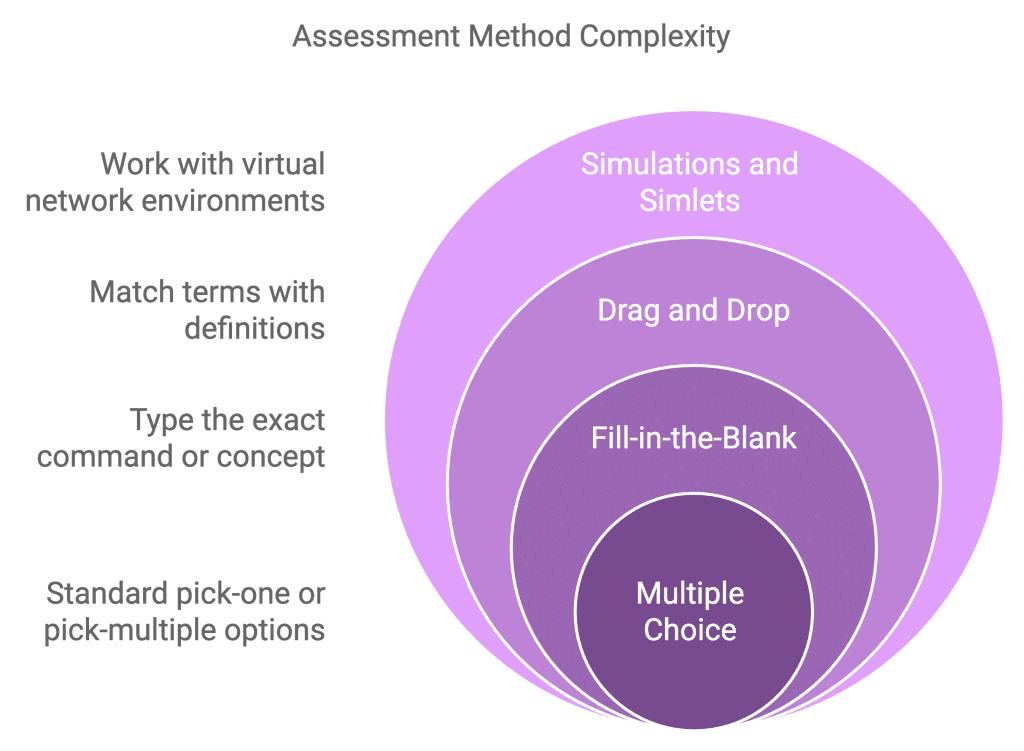
The entire exam lasts 120 minutes. While it might sound like a lot of time, it flies by once you’re deep into the questions. With roughly 100 questions to get through, you’ll need to keep a steady pace—don’t get stuck on one question too long.
What makes the CCNA different from other cert exams is its focus on practical application. You’re not just choosing the right answer; you’re demonstrating that you can solve real-world networking issues.
Core Topics and Question Distribution
The exam covers a wide range of topics, and Cisco has organized them into key categories. Each category carries a specific weight in the exam, so knowing how much to focus on each area is crucial.
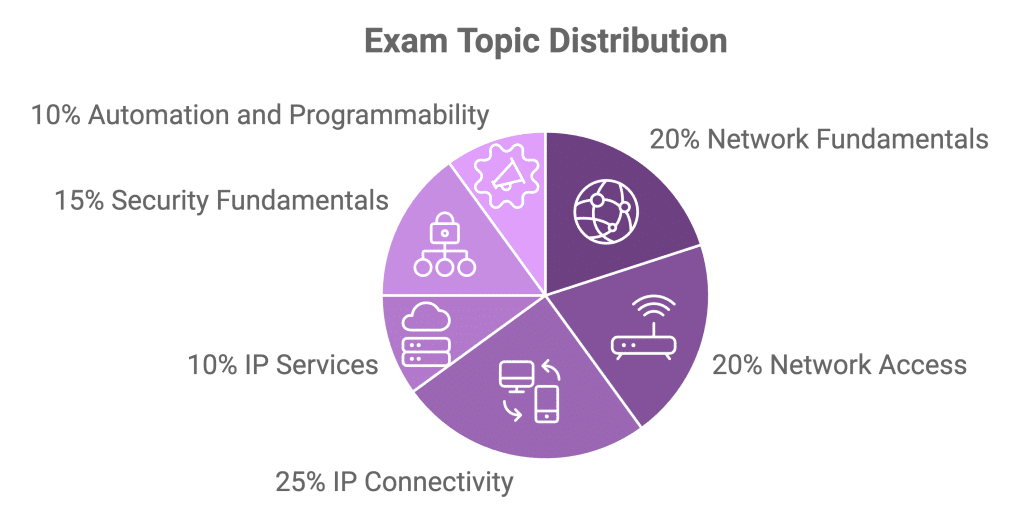
- Network Fundamentals (20%)
This is the foundation of everything else. You’ll cover IP addressing, subnetting, the OSI model, and basic device configurations. If you’re new to networking, spend extra time here—it’s the base layer for all other topics. - Network Access (20%)
This section dives into Layer 2 concepts like switching, VLANs, and spanning tree protocols. You’ll also touch on wireless networking, including basic setup and troubleshooting. - IP Connectivity (25%)
Routing protocols like OSPF and static routing are key here. You’ll need to know how to configure and troubleshoot routes and understand how data flows across networks. - IP Services (10%)
This section includes DHCP, NAT, and DNS—things that make networks functional for users. While it’s a smaller part of the test, don’t skip it. - Security Fundamentals (15%)
Network security is a big deal. You’ll need to know about access control lists (ACLs), basic firewall configurations, and VPNs. - Automation and Programmability (10%)
This is Cisco’s nod to the future. It’s a smaller section, but knowing the basics of APIs and network automation tools is still important.
Questions are distributed across these categories, but the exact split isn’t revealed by Cisco. The best strategy is to be well-rounded—don’t focus too heavily on one area at the expense of others.
How Much Time Do You Really Have to Prepare?
Here’s the honest answer: it depends. If you’re starting from scratch with no networking background, you’ll need a solid 3 to 6 months of consistent study. For those with IT experience, especially in networking, you might cut that time in half.
A typical prep schedule looks like this:
- First Month: Focus on the basics—network fundamentals and IP addressing. Use books like the “Cisco CCNA Official Cert Guide” or free resources like CBT Nuggets for foundational learning.
- Second Month: Dive into routing and switching. Practice configuring VLANs and understanding routing protocols using tools like Cisco Packet Tracer.
- Third Month: Hone your troubleshooting skills. Work through as many practice exams as you can, paying attention to weak areas.
The key is hands-on practice. Use lab simulators or real Cisco devices if you have access. Reading is important, but configuring a router or debugging a network issue will make the concepts stick.
If you’re short on time, try a bootcamp. These intensive programs cram months of material into a few weeks. They’re not for everyone, but they can be a lifesaver if your schedule is tight.
To conclude, the CCNA exam isn’t easy, but it’s designed to be passable if you put in the work. It’s not about tricking you—it’s about testing whether you’re ready to work in a networking environment. Whether you’re a complete beginner or brushing up on existing skills, knowing the structure, topics, and prep time can help you approach the exam with confidence.
The Practical Benefits of Earning Your CCNA
Getting a CCNA isn’t just about passing an exam, it’s about opening doors. Whether you’re just starting in IT or you’ve been around for a while, this cert has a way of leveling up your career. People talk about it being a “foundation cert,” but in reality, it’s much more. It’s like having a golden ticket that says, “Hey, I understand networks, and I can actually work with them.”
Job Roles and Opportunities After Certification
Let’s get this out of the way: CCNA doesn’t guarantee you a six-figure salary overnight. But it does qualify you for jobs that can lead there. Employers love seeing it because it’s proof that you know your basics and then some.
Here’s what you might step into right after getting CCNA certified:
- Network Technician: You’ll troubleshoot connectivity issues, set up small networks, and maybe configure some routers and switches. It’s hands-on and a great way to build experience.
- Help Desk Analyst: This role isn’t just about fixing printers. Many help desk positions involve troubleshooting network issues, which is where your CCNA skills shine.
- Network Administrator: As you gain experience, you could step into a role where you’re managing entire networks. CCNA is often a must-have for these jobs.
- System Engineer: You’ll work on larger projects involving both networking and system design. Think VLAN setups, configuring firewalls, and ensuring network stability.
If you’re ambitious, you can climb higher into roles like Network Engineer or Security Analyst. The CCNA lays the groundwork, and with the right experience, you can take it as far as you want.
To explore real-world salaries and future career paths, read our full breakdown on CCNA 200-301 salary and job opportunities in 2026.
Global Recognition and Industry Demand for CCNA Professionals
One of the best things about the CCNA is its global recognition. Cisco is everywhere, and when you carry a CCNA, it’s like you’re part of a worldwide club of networking pros. Employers in the US, Europe, Asia, and pretty much everywhere else know what this cert means.
The demand for CCNA-certified professionals is strong. Every business relies on networks, and they need people who can keep them running. Whether it’s a startup setting up its first office or a multinational managing complex systems, network talent is always in demand.
And here’s the kicker: CCNA isn’t just for traditional IT companies. Industries like healthcare, education, finance, and even retail are looking for network pros. They all need someone to handle their routers, switches, and security systems. CCNA gives you the versatility to work in almost any field.
The Certification’s Role in Advancing Your Career Path
Think of CCNA as a stepping stone, but not just any stepping stone, it’s the solid one that doesn’t wobble. It’s a cert that holds value at every stage of your career.
For Beginners
When you’re just starting, CCNA is a game-changer. It sets you apart from other entry-level candidates who might only have theoretical knowledge. With CCNA, you’re telling employers, “I can actually do this stuff, not just talk about it.”
For Mid-Career Pros
If you’re already in IT but feel stuck, CCNA can be the push you need to specialize. Let’s say you’re doing general IT work—installing software, setting up PCs—but you want to get into networking. CCNA gives you the skills and confidence to make that shift.
For Veterans Without Certs
Maybe you’ve been in IT for years, and you’ve got the experience but no certs to show for it. CCNA can formalize your knowledge and give you a credential that employers respect. It’s especially useful if you’re eyeing a promotion or a role at a new company that requires certs.
For Moving Up the Ladder
CCNA doesn’t just stop with entry-level roles. It’s a foundation for advanced Cisco certs like CCNP (Cisco Certified Network Professional) or CCIE (Cisco Certified Internetwork Expert). These higher-level certs can lead to roles like Network Architect or even IT Director.
Why Employers Care About CCNA
Employers see CCNA as a benchmark. It tells them you’ve been tested on real-world skills, not just theory. They know you’ve got a solid understanding of networking basics, from configuring devices to troubleshooting problems.
And because Cisco gear is used so widely, having a CCNA means you’re familiar with the tools they’re already using. It’s one less thing they have to train you on.
Plus, CCNA isn’t just about technical skills. It shows you can learn, commit, and follow through. These are traits every employer values, no matter the industry.
The Long-Term Value of CCNA
This isn’t a cert you get and forget about. The skills you learn for CCNA are the building blocks of networking. Even as technology evolves, the fundamentals don’t change. Understanding how IP addressing works, knowing what a VLAN is, and being able to set up routing protocols—these are skills that stay relevant.
And because the CCNA now includes automation and security basics, it’s future-proof. You’re not just learning what’s important today; you’re getting a glimpse of what’s next in networking.
In short, CCNA is more than a cert—it’s a career booster. Whether you’re starting out, switching paths, or climbing the ladder, it’s one of the smartest investments you can make in your IT career. Let me know if you’d like me to expand on any specific aspect!
What Does the CCNA Certification Cost, and Is It Worth It?
When people think about getting certified, one of the first questions is always: “How much is this going to cost me?” It’s a valid concern. Certifications like the CCNA aren’t cheap, and they require a real commitment of both time and money. But here’s the deal: the CCNA isn’t just an expense; it’s an investment in your career. Let’s break it all down and see if it’s worth your hard-earned cash and effort.
A Breakdown of Exam Fees and Related Costs
At its core, the CCNA exam costs $300. This is the fee you pay to Cisco or an authorized testing center when you schedule your exam. But that’s just the tip of the iceberg. There are other costs you’ll need to factor in:
- Study Materials
- Books: The official Cisco CCNA Certification Guide is a go-to resource, and it costs around $40–$60.
- Online Courses: Platforms like CBT Nuggets, Udemy, or Pluralsight offer video tutorials, ranging from $20 (on sale) to $300+.
- Practice Tests: Expect to pay $30–$50 for good-quality practice exams that mimic the real test.
- Lab Simulators and Tools
- If you want to practice configuring routers and switches, you’ll need a lab setup. Cisco Packet Tracer is free, but more advanced simulators like GNS3 or Boson can cost $100+.
- Some people prefer to buy used Cisco equipment for hands-on experience, which can set you back $200–$500.
- Time Costs
- Preparing for the CCNA takes time—anywhere from 3 to 6 months for most people. While not a direct monetary cost, the time you spend studying could be spent working or on other activities.
Add everything up, and you’re looking at a total cost of $400 to $1,000, depending on how deep you go with study resources. For those on a tight budget, there are free resources available, but they might not be as comprehensive.
Return on Investment: Time, Money, and Effort
Here’s the million-dollar question: Is the CCNA worth the price tag? The answer depends on your career goals, but for most people in IT, the answer is a resounding yes.
The Money Factor
The starting salary for CCNA-certified professionals ranges from $50,000 to $80,000 annually in many countries. Compare that to the $300 exam fee and a few hundred more for study materials, and you’re looking at a huge return on investment. Over time, the cert pays for itself many times over.
The Time Factor
Studying for the CCNA takes dedication. Most people spend 10–15 hours per week for 3 to 6 months. It’s a significant commitment, but the skills you gain—like troubleshooting, configuring networks, and understanding IP protocols—stay with you for life.
The Effort Factor
Let’s be honest: the CCNA isn’t a cakewalk. It’s challenging, and it’s meant to be. But that’s why it holds so much value. Employers know it’s not a cert you can cheat your way through. The effort you put into earning it reflects your dedication and technical ability, which are qualities every IT manager looks for.
How to Decide if CCNA Is the Right Certification for You
Not everyone needs a CCNA, and that’s okay. Here are some questions to ask yourself before committing:
- Are You Interested in Networking?
If you’re passionate about how data moves, how devices communicate, and how networks are secured, the CCNA is a great fit. If networking bores you, it might not be the best path. - Where Are You in Your Career?
- If you’re a beginner looking for a foothold in IT, the CCNA can be your launchpad.
- If you’re mid-career and want to specialize in networking or move up the ladder, it’s a valuable asset.
- If you’re already advanced and focused on other areas like cloud computing or cybersecurity, you might not need it.
- Can You Commit the Time and Effort?
The CCNA isn’t something you can cram for in a weekend. It requires consistent effort over weeks or months. Be honest with yourself about whether you can dedicate the time. - Is Networking a Big Part of Your Job or Career Goals?
If your job involves or will involve managing routers, switches, or any kind of network troubleshooting, the CCNA is almost essential. It’s also a stepping stone to advanced Cisco certifications like CCNP or CCIE.
Is CCNA 200-301 Really Worth It?
For most people in IT, the CCNA is a no-brainer. The skills you gain, the job opportunities it opens up, and the salary boost you get all make it a worthwhile investment. But it’s not for everyone. If you’re more interested in software development, cloud computing, or cybersecurity, other certs might be a better fit.
Think of the CCNA as a key that unlocks doors. It won’t magically make you a networking expert overnight, but it will show employers that you have the foundation to build on. And in an industry as fast-paced as IT, having that foundation is everything.
Real-World Skills You Gain from the CCNA 200-301
Getting a CCNA isn’t just about passing an exam; it’s about learning skills that actually make a difference in real-world networking jobs. Unlike some certs that are heavy on theory, CCNA 200-301 is designed to prepare you for practical scenarios. These aren’t the kind of skills you learn once and forget—they’re the building blocks for a long IT career.
Hands-On Networking and Configuration Abilities
The CCNA gives you the confidence to configure routers, switches, and wireless networks without second-guessing yourself. It’s one thing to read about VLANs in a textbook; it’s another to create them in a live setup. You’ll work through tasks like setting up static routes, implementing DHCP, and configuring NAT. These aren’t just exam topics, they’re things you’ll actually do on the job.
When you’re troubleshooting a connectivity issue, you’ll know how to isolate the problem and fix it. Maybe the router’s default gateway is wrong, or there’s a misconfigured ACL blocking traffic. The CCNA teaches you how to approach these problems logically, which is exactly what’s expected of a network admin or engineer.
Troubleshooting Skills That Employers Value
One of the standout benefits of CCNA training is the focus on troubleshooting. In the real world, networks go down, users complain about slow connections, and someone always accidentally unplugs a cable. Your job is to figure out what’s wrong and fix it quickly.
CCNA prepares you for this by giving you a methodical approach to problem-solving. Instead of randomly trying fixes, you’ll know how to use tools like ping and traceroute to diagnose the issue. Maybe it’s a DNS problem, or maybe there’s a routing loop—you’ll be able to spot it and solve it.
Employers love candidates who can handle these kinds of challenges. Troubleshooting isn’t something you can fake, and having CCNA-level skills puts you ahead of the competition.
Staying Ahead in Automation and Security Trends
The CCNA isn’t stuck in the past. It incorporates topics like automation and network security, which are critical in modern IT environments. You’ll get introduced to concepts like APIs and basic scripting, which allow you to manage networks more efficiently.
On the security side, CCNA covers essentials like firewalls, VPNs, and access control lists. These skills are more relevant than ever, given the rise of cyberattacks. Even if you don’t end up specializing in security, understanding the basics makes you a more valuable team member.
Studying for CCNA 200-301: What Actually Works?
Preparing for the CCNA is a commitment, but it doesn’t have to feel impossible. With the right approach and resources, you can break it down into manageable steps. The key is finding a study plan that works for you and sticking with it.
The Best Study Resources (Books, Online Courses, and Labs)
If you’re serious about passing, you’ll need a mix of resources:
- Books: The official “Cisco CCNA Certification Guide” is a must-read. It’s detailed, well-organized, and directly aligned with the exam topics.
- Online Courses: Platforms like CBT Nuggets or Udemy are excellent for visual learners. They walk you through concepts with video tutorials and often include practice labs.
- Lab Tools: Cisco Packet Tracer is free and perfect for simulating network setups. If you want more advanced options, GNS3 or even physical hardware is worth exploring.
Tips for Managing Study Time Effectively
Time management is everything when prepping for CCNA. Here are a few tips to keep you on track:
- Set Goals: Break the syllabus into sections and tackle one at a time. For example, spend a week mastering VLANs before moving on to routing protocols.
- Practice Daily: Networking is hands-on, so make time for labs every day, even if it’s just 30 minutes.
- Use a Study Plan: Stick to a schedule. Whether it’s 10 hours a week or 20, consistency is key.
Do Practice Exams Really Help?
Absolutely. Practice exams aren’t just about testing your knowledge; they’re about learning how to manage time and handle exam pressure. The more practice questions you do, the more comfortable you’ll feel on test day.
Look for high-quality practice exams that mimic the real thing. These will help you identify weak areas and reinforce your understanding of key concepts.
How Does Cert Empire’s Exam Dumps Help in Preparation?
Cert Empire has built a reputation for providing reliable, up-to-date exam dumps, and they can be a game-changer for CCNA prep. Here’s how they help:
- Realistic Question Bank: Cert Empire’s dumps include questions that closely resemble those on the actual exam. This gives you a clear idea of what to expect.
- Time-Saving: Instead of spending hours searching for resources, you get a comprehensive set of questions and answers in one place.
- Reinforcement: Going through dumps reinforces what you’ve learned from books and labs. It’s like filling in the gaps in your knowledge.
- Confidence Boost: Familiarity with exam-style questions reduces anxiety on test day, helping you focus better.
Cert Empire isn’t about shortcuts; it’s about smart preparation. When combined with proper study and practice, their CCNA 200-301 exam dumps can significantly improve your chances of passing. To see where you stand right now, you can also try a free CCNA 200-301 practice test before diving into full prep.
Preparing for the CCNA takes effort, but the skills you gain and the career opportunities that follow make it all worth it. If you’re ready to dive in, use every resource at your disposal, practice relentlessly, and remember: the journey is as valuable as the destination. Let me know if you want me to elaborate further!
Common Questions About CCNA 200-301 Certification
When it comes to certifications, everyone has questions—some practical, some fueled by nervous energy. The CCNA 200-301 is no exception. Here’s a no-nonsense look at the most common questions people ask about this cert and what you really need to know.
“How Hard Is the CCNA 200-301 Compared to Other Certifications?”
Let’s be real: the CCNA isn’t a walk in the park, but it’s also not impossible. On a difficulty scale, it falls somewhere between entry-level certs like CompTIA Network+ and advanced ones like CCNP. If you’ve got some basic IT knowledge, you’ll find it challenging but manageable.
The difficulty lies in the breadth of topics. You’re not just learning how to configure a router—you’re covering subnetting, routing protocols, VLANs, wireless, security, and even automation basics. That’s a lot to cram into one exam.
What makes CCNA stand out is its hands-on focus. Unlike some certs that test rote memorization, CCNA expects you to solve problems. If you’re the type to skip labs and hope for the best, you’ll struggle. But if you put in the work—reading, practicing, and taking mock tests—you’ll get through it.
“Do I Need to Renew My CCNA Certification, and How Often?”
Yes, you need to renew it. Cisco wants to make sure its certs stay relevant, so the CCNA expires every three years. That means you’ll need to recertify if you want to keep your credentials current.
But here’s the good news: Cisco gives you options. You can either retake the CCNA exam or earn continuing education credits by attending Cisco-approved training or passing a more advanced cert exam like CCNP. If you’re moving up the career ladder, the second option makes more sense.
Keeping your CCNA active is important, especially if you’re using it to land or keep a job. An expired cert can make you look out of touch, which is the last thing you want in IT.
“Is CCNA 200-301 Certification Enough for a High-Paying Job?”
This one’s tricky. CCNA alone isn’t going to land you a $100k job, but it’s a strong start. Employers value the cert because it shows you’ve got the fundamentals down.
Think of CCNA as a launchpad. It qualifies you for entry-level to mid-level roles like Network Technician, Help Desk Support, or Junior Network Administrator. These jobs pay decently—anywhere from $50k to $80k, depending on location and company.
To climb higher, you’ll need experience and possibly more certs. Pairing CCNA with skills in cloud computing, security, or automation can push you into higher-paying roles. But make no mistake: CCNA gets your foot in the door, and that’s half the battle.
“What’s the Pass Rate for CCNA 200-301, and Why?”
Cisco doesn’t officially release pass rates, but estimates suggest it’s around 50–60%. That might sound low, but there’s a reason. The CCNA isn’t designed to be easy. It tests practical skills and knowledge, so if you don’t prepare properly, you’ll struggle.
A big reason people fail is underestimating the exam. They focus too much on theory and not enough on labs. The CCNA expects you to apply what you’ve learned, not just regurgitate facts. If you don’t know how to troubleshoot a network issue or configure a VLAN, the exam will trip you up.
But here’s the thing: with the right prep—good study materials, regular practice, and maybe some help from Cert Empire’s dumps—you can pass. The test is tough, but it’s not unfair. It rewards preparation, plain and simple.
Conclusion
The CCNA 200-301 isn’t just another cert; it’s a gateway to a better career. It’s challenging, yes, but it’s worth every bit of effort you put into it. You’re not just learning theory—you’re gaining real-world skills that employers value, from configuring networks to troubleshooting problems under pressure.
The cost of the cert, both in terms of money and time, is an investment that pays off. Whether you’re a beginner looking to break into IT or a mid-level professional aiming to specialize, the CCNA can open doors. And while it’s not a magic ticket to a high-paying job, it lays the groundwork for a career in networking, security, or even cloud computing.
To make the most of your prep, use every tool at your disposal. From official Cisco resources to hands-on labs and practice exams, the right approach can make all the difference. And if you’re looking for an edge, Cert Empire’s dumps can help reinforce what you’ve learned, giving you the confidence to tackle the test head-on.
At the end of the day, the CCNA is about more than just passing an exam. It’s about proving to yourself and the industry that you’re ready to take on the challenges of modern IT. So, if you’re thinking about it, stop hesitating and dive in. The skills you gain and the opportunities that follow will be well worth it. Let me know if you’d like further elaboration!
If you are interested in reading more about Best Networking Certifications or Best IT Certifications, read our other blog posts.

